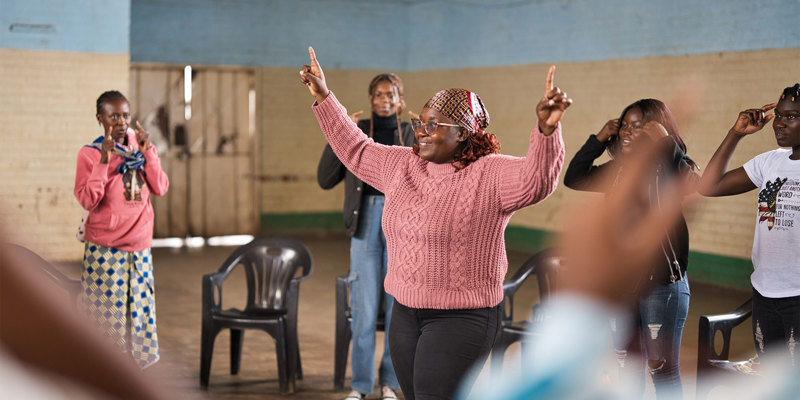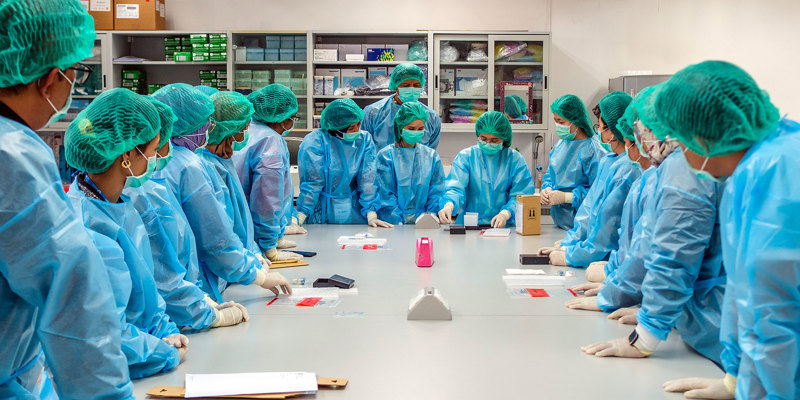Global Fund-led initiative slashes cost of anti-Malaria medicines in many African countries
25 April 2012
Life-saving malaria treatment can be bought for less than one US dollar
Geneva - An innovative initiative led by the Global Fund to Fight AIDS, Tuberculosis and Malaria to put affordable and effective anti-malaria medicines in remote communities in Africa, is making rapid progress in Ghana, Kenya, Madagascar, Nigeria, Tanzania and Uganda.
The initiative, called Affordable Medicines Facility for Malaria (AMFm), which is managed by the Global Fund, allows people to buy life-saving malaria treatment in private stores and pharmacies for less than one U.S. dollar. Comparable malaria medicines outside the program cost up to ten to twenty times as much.
"The innovation is working, bringing relief to millions who need quality anti-malaria medicines at affordable prices. The AMFm is a game-changer in financing access to malaria treatments," says Dr. Olusoji Adeyi, who heads the AMFm initiative at the Global Fund in Geneva.
About 216 million people fall ill with malaria every year and 655,000 die from the disease, mostly children in Africa.
AMFm is making anti-malaria medicines, called artemisinin-based combination therapies (ACTs), available as widely and inexpensively as possible to those who need them. It allows people to obtain effective drugs without having to travel long distances to reach public health clinics. AMFm is also helping to drive out ineffective medicines off the market, making effective ACT treatment available and accessible to millions of people.
Although the World Health Organisation specifically recommends ACTs as treatment for uncomplicated malaria, the most deadly form of the disease, the drug accounts for only about one in five of all treatments taken for the disease. Until recently it has only been available for free or at low cost in public health facilities.
Reduced prices are possible because the Global Fund first negotiates a discounted price for ACTs with drug manufacturers and pays most of the reduced price on behalf of importers from the private, NGO and public sectors. Private wholesalers then sell ACTs to retailers at reduced prices allowing pharmacies and stores to sell the drugs to patients and caregivers with an additional mark-up, while keeping the retail price affordable.
Early findings show that AMFm is working effectively. The first round of global negotiations with malaria drug manufacturers in 2010 resulted in price decreases of up to 80 per cent. As of end March 2012, the Global Fund has approved AMFm payments for about 231 million ACTs. In several African countries, this has led to dramatic falls in over-the-counter drug prices.
The Global Fund has commissioned a full and independent evaluation of the first phase of the AMFm initiative. The evaluation report will be published at the end of 2012.
Early indications from surveys by Health Action International show increased availability of treatment and dramatic drops in the retail prices of ACTs in Ghana, Kenya, Madagascar, Nigeria, Tanzania and Uganda. The median retail price ranges from US$0.46 to $1.67. For comparable brand-name medicines outside the program, the median retail prices range from US$6.24 to 10.84.
The first phase of AMFm includes seven countries in Africa - Ghana, Kenya, Madagascar, Niger, Nigeria, Tanzania (including Zanzibar) and Uganda - and one in Asia: Cambodia.
The subsidy for malaria medicines is financed by UNITAID, the Government of the United Kingdom, the Bill and Melinda Gates Foundation and the Government of Canada.
Governments of implementing countries are supporting AMFm with public awareness campaigns and training for ACT providers. This part of the initiative is financed by the Global Fund and country governments.







